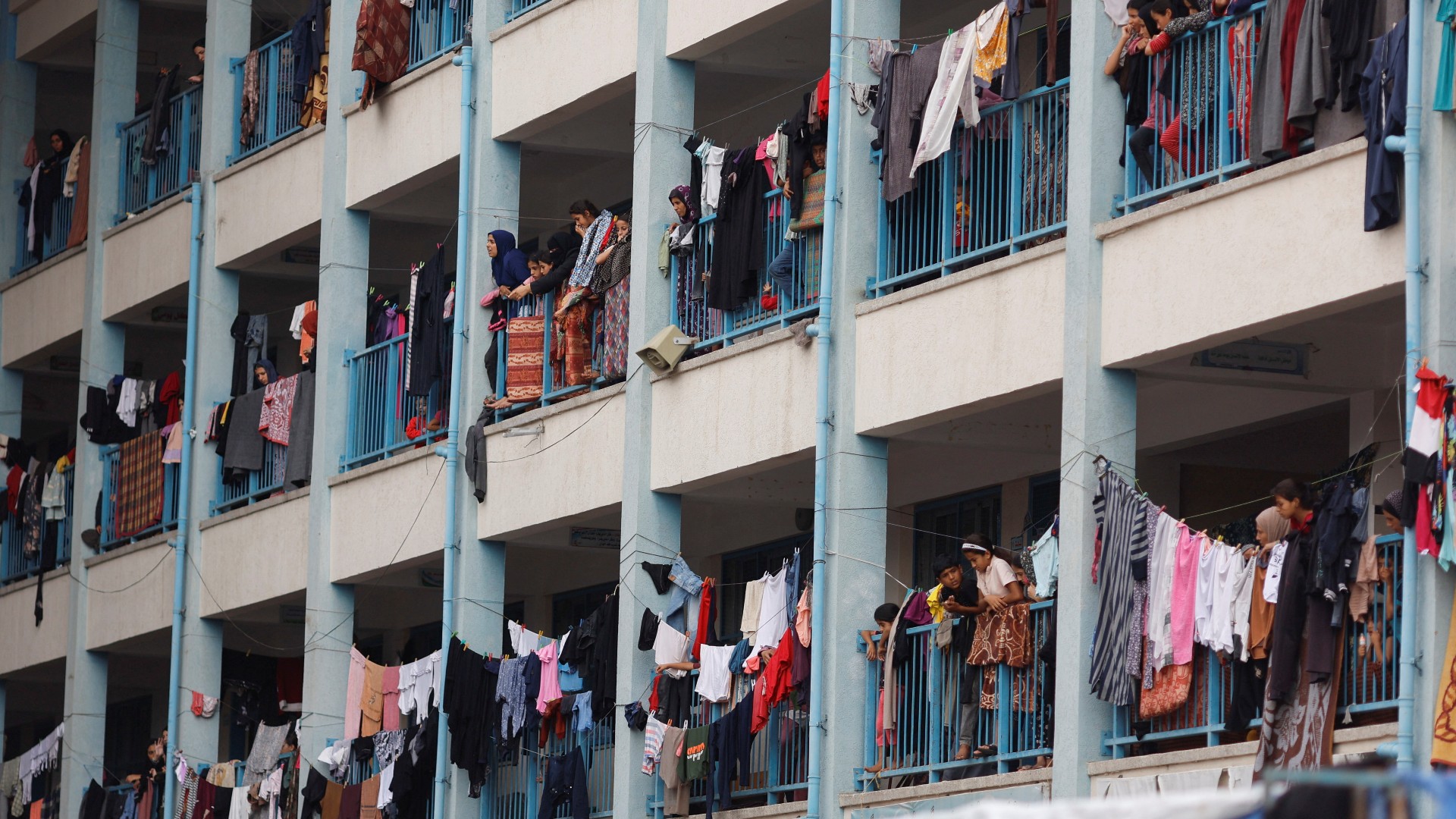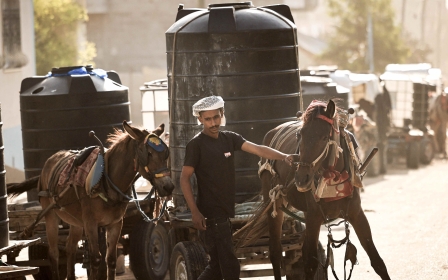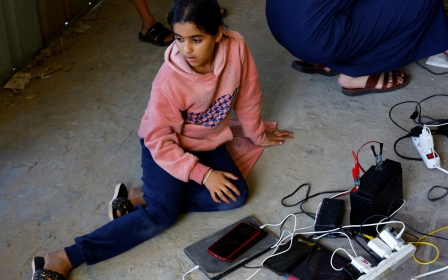Israel-Palestine war: Disease rife in Gaza Unrwa schools sheltering thousands
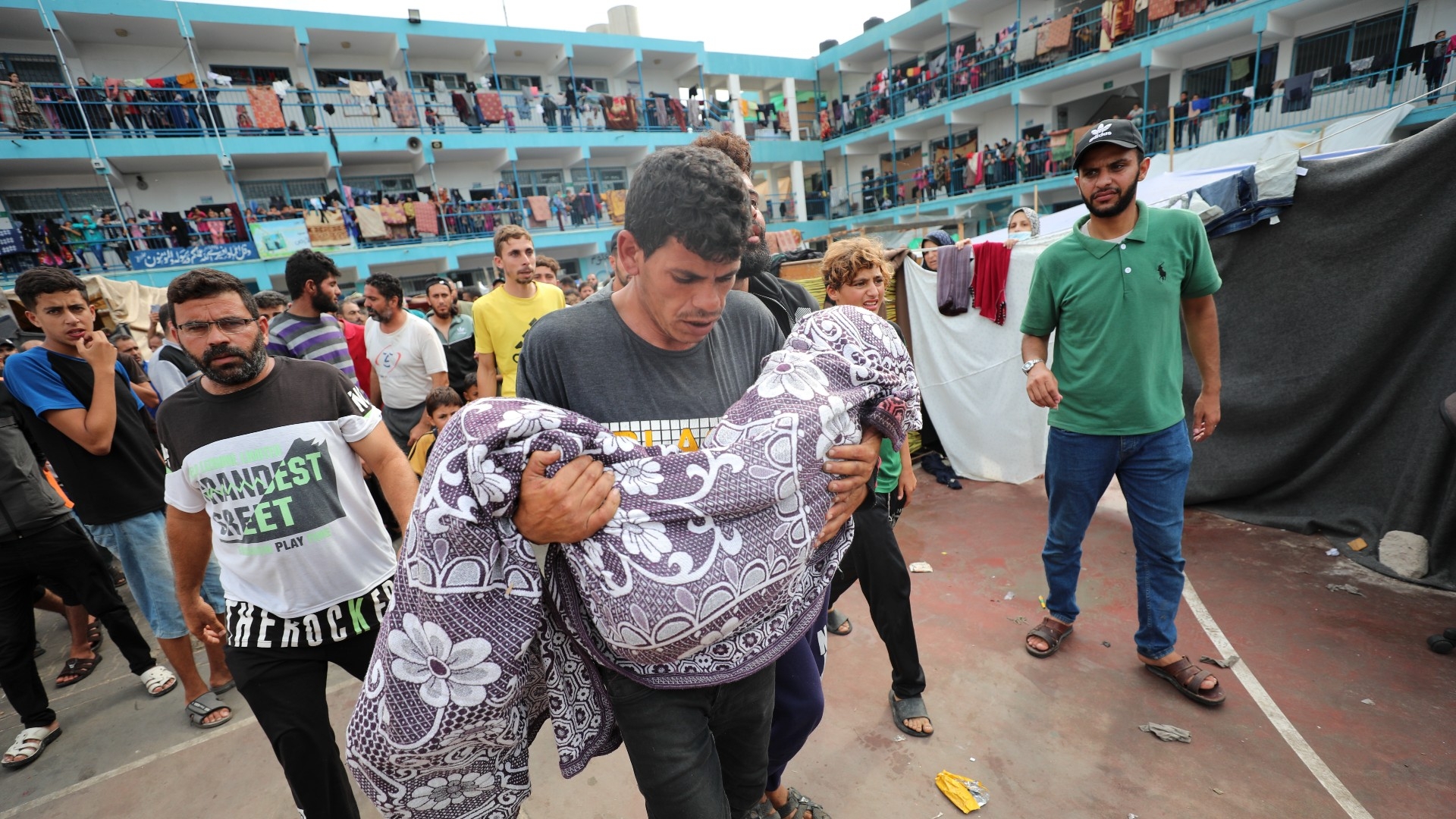
In a tent set up in the playground of the Deir al-Balah School for Girls in Gaza, the Abu Oweili family took refuge from the Israeli bombardment of their neighbourhood.
The Palestinian family is like tens of thousands of other families who fled their homes in the northern Gaza Strip and Gaza City, and are currently scattered in schools run by the United Nations Relief and Works Agency (Unrwa) in the southern part of the besieged enclave.
According to healthcare professionals providing support to the internally displaced persons (IDPs) in the schools, epidemics are spreading fast due to the lack of clean water, medicine, and hygiene products.
“We have been displaced twice since the beginning of the war. We first fled to the Gaza School for Boys [in Gaza City], before the Israelis dropped leaflets telling us to evacuate. We took a taxi and had to pay him 200 shekels [$50] to flee to this school,” Wael Abu Oweili, a former resident of Gaza City, told Middle East Eye.
“Since we came here, we have been getting sick all the time. We are suffering from diarrhoea, vomiting, and fever. And it is not just us, almost everyone here suffers the same [symptoms]. They mostly give us paracetamol and it is not enough,” he added.
New MEE newsletter: Jerusalem Dispatch
Sign up to get the latest insights and analysis on Israel-Palestine, alongside Turkey Unpacked and other MEE newsletters
The 26-year-old father is staying along with 24 members of his family, including his mother, brothers, sisters, and their children in a two-by-three square-metre tent behind the school’s main building.
“If our health condition worsens, they sometimes give us antibiotics. And we have to secure the rest of the medicines ourselves.
"I used to sell vegetables, but since the beginning of this war I haven’t been able to work and thus don’t have any money,” he told Middle East Eye.
Follow Middle East Eye's live coverage for the latest on the Israel-Palestine war
Of the over 8,000 people taking refuge in the Deir al-Balah School in the central Gaza Strip, epidemics have spread among at least 90 percent, according to doctors working there. The most common and fast spreading diseases that are turning into epidemics in accommodation centres are gastroenteritis, scabies and chicken pox, doctors told MEE.
“Almost everyone here has gastroenteritis, accompanied by diarrhoea, vomiting, fever and a sore throat. This is an expected result of the disastrous conditions in the IDP accommodation centres,” Abeer Salem, a volunteer nurse at the Deir al-Balah School, told MEE.
“Water is not always available, and when it’s available, it’s not clean. There are no hygiene products," she added.
'Since we came here, we have been getting sick all the time. We are suffering from diarrhoea, vomiting, and fever'
- Abeer Salem, nurse
"Mothers here would love to keep their children clean and healthy, but where do they get these products? Every day my colleague and I check on the families here, and in all the classrooms we enter, there are dozens of people, mainly children, suffering from these symptoms.
“Once we enter the classroom, all mothers ask for diapers because their children suffer from diarrhoea and need to change their diapers around six to seven times. We don’t have enough diapers to cover the needs of all families, so we give each mother a few ones each day."
Salem added that IDPs seeking refuge outside the school also come to ask for medicine and diapers as they fled their homes without enough money. The majority of children, she says, are wetting their clothes because of the trauma and the cold.
“It gets very cold at night, people sleep on the floor and don’t have enough blankets," she explained.
"Many children in each classroom are wetting their clothes. A few days ago, a mother came telling me she herself is wetting her clothes,” she continued.
“You can imagine that all of these people are wetting their clothes and blankets several times a day and there are not enough hygiene products to clean them. The epidemics are spreading very quickly.”
According to Salem, around 30-50 people stay in each classroom, and such cramped conditions enable the spread of disease.
Giving birth in schools
But what is more dangerous, she says, is that some pregnant women were forced to give birth inside the accommodation centres, including the schools, while ambulances could not reach them as the bombardment continues.
Seven months-pregnant Asmahan al-Toum, who fled her home in the northern Gaza Strip, says she is terrified that she might be forced to give birth in one of the school’s classrooms.
“My home was bombed and I came here along with my husband and two children since the first day of the war. As a pregnant woman, I used to take vitamins and other supplements. Here, I haven’t been able to have any of those. I cannot even find a mattress to sleep on. I sleep on the sand,” she said.
“Even the water is not clean. Every time I drink water, I get sick and suffer from diarrhoea and fever. Can you imagine having a foetus inside your belly and only getting to eat less than one loaf with a small amount of canned meat a day?”
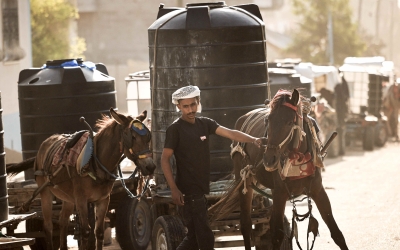
Healthcare professionals in the school receive daily reports from other accommodation centres, including Unrwa-run schools, about new diseases spreading among the displaced people.
The potential for disease is exacerbated by Israel’s targeting of schools across the Strip, eventually forcing increasing numbers of IDPs into the remaining crowded buildings.
According to the Housing and Works Ministry in Gaza, at least 203 schools have been targeted or damaged in the ongoing bombardment of the coastal enclave.
“If we are not killed from the bombing, we are killed from these diseases that we don’t have medicine to cure,” Salem said.
The Israeli bombardment of the Gaza Strip has killed over 8,500 Palestinians, mostly women and children, since 7 October.
The military assault followed a Hamas-led incursion on southern Israel that killed an estimated 1,400 Israelis, most of them civilians.
Middle East Eye delivers independent and unrivalled coverage and analysis of the Middle East, North Africa and beyond. To learn more about republishing this content and the associated fees, please fill out this form. More about MEE can be found here.


